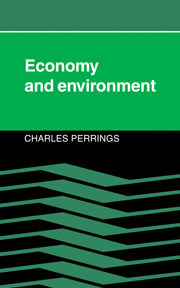 Economy and Environment
Economy and Environment Book contents
- Frontmatter
- Contents
- Preface
- Notation Guide
- 1 Introduction
- Part I The physical economy-environment system
- Part II The economic system
- Part III Environmental strategies in an evolutionary economy-environment system
- 8 Time, uncertainty, and external effects
- 9 The market solution
- 10 The stationary state
- 11 Conclusions
- References
- Index
11 - Conclusions
Published online by Cambridge University Press: 20 March 2010
- Frontmatter
- Contents
- Preface
- Notation Guide
- 1 Introduction
- Part I The physical economy-environment system
- Part II The economic system
- Part III Environmental strategies in an evolutionary economy-environment system
- 8 Time, uncertainty, and external effects
- 9 The market solution
- 10 The stationary state
- 11 Conclusions
- References
- Index
Summary
Closing the mind with the model
What marks off the primitive economies and their watchers, the anthropologists, is an acute awareness of the interaction between the economy and its environment. The observation that primitive economies exist within the limits imposed by a constantly changing environment occurs time and time again in the anthropological literature. Yet the environmental constraints to economic activity warrant only passing mention in the economic literature. The environment made its appearance in the classical works of Malthus, Smith, and Ricardo only obliquely – through the land scarcity that underlies the theory of diminishing returns. But if the classical political economists had little regard for the environmental constraints to growth, their successors seem to have none at all. Despite the fact that the scarcity of resources was enshrined as the raison d'être of the theory of resource allocation by Robbins (1932), it has disappeared as a meaningful concept from modern dynamic general equilibrium theory. Indeed, as we have already seen, theories resting on the strong environmental assumption simply wish away the environment altogether, while theories resting on the weak environmental assumption suppose that a string of substitutable resources of one sort or another are available in limitless supply.
The difference is that anthropologists are first of all observers. Their primary concern is the description of real human societies. Economics, and theoretical economics in particular, has increasingly adopted different concerns. Theoretical economics has become what Kornai calls a “logical mathematical” as opposed to a real science.
- Type
- Chapter
- Information
- Economy and EnvironmentA Theoretical Essay on the Interdependence of Economic and Environmental Systems, pp. 153 - 167Publisher: Cambridge University PressPrint publication year: 1987
- 1
- Cited by


